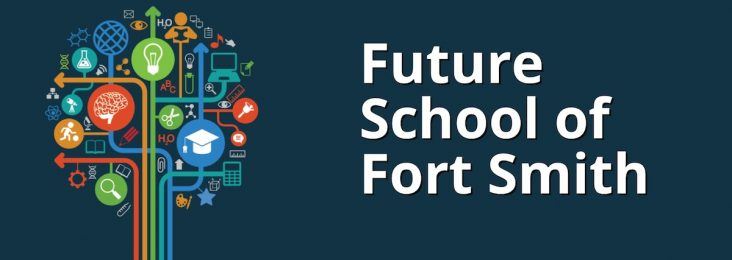Making the enrollment case for Future School of Fort Smith
by January 20, 2016 2:59 pm 341 views

Editor’s note: Trish Flanagan is leading the Future School of Fort Smith effort.
Opinions, commentary and other essays posted in this space are wholly the view of the author(s). They may not represent the opinion of the owners of Talk Business & Politics.
––––––––––––––––
Student-centered, real world learning, personalization, college and career access, diverse classmates. This defines the student experience at the Future School of Fort Smith – the first tuition-free, public charter high school option in Fort Smith.
As a public charter school, there is no cost or criteria for acceptance; any student entering the 10th grade, living anywhere in Arkansas can attend Future School.
Why consider Future School? We offer a student-centered approach to high school education, where each student is at the center of their educational experience. Each student is supported by a learning team of the student, their advisor, instructors, parents and a community mentor. Throughout the year, the learning team works to identify how the student learns best and develops personal and academic goals for high school and beyond. With guidance from the learning team, students design and implement internship projects each semester where they further develop academic and professional skills by solving real world problems in areas of personal interest.
To meet the needs of our diverse learners, students have choices in the delivery of their courses. Earning all of the required credits to graduate high school, a student might choose to earn their 10th grade English credit by working on a project-based course on our campus. That same student might choose to learn math concepts in an individualized, self-paced online course made accessible by the laptop provided for each student. Or a student might want to earn this same credit, as well as college credit, through the concurrent courses offered through our partnership with the University of Arkansas at Fort Smith.
To prepare for the real world in college and career, each student has the opportunity to apply what they are learning by working on internship projects designed around their interests, goals and learning style. Students consider what they are interested in, connect with potential internship sites through online research and informational interviews and design and implement a plan to accomplish goals for the internship. By working in the real world each week, students learn how to advocate for themselves and communicate effectively with adults, developing skills and mindsets necessary to succeed in college and career.
You might be thinking that real world learning sounds great, but how does it work? Consider Monica, a student interested in botany who develops an internship at a local landscape company contracted to create outdoor space at the new U.S. Marshal’s Museum. With support from her learning team, Monica presents her project proposal to her mentor at the company. She plans to identify every insect that might have an adverse or beneficial effect on the landscape they create. The work in her project-based biology class on Wednesday is helping Monica understand plant cellular structure. Yet, to change things up and allow for authentic assessment, Monica and her biology instructor plan to incorporate her internship work in class by creating a standards-based project that explains the biological environment she and her mentor are designing for the museum.
Monica’s real world learning is also incorporated into her advanced spreadsheet applications class, where she creates a detailed spreadsheet to calculate overall landscape costs of the project. At the end of the semester, she presents a portfolio of what she has learned academically, professionally and personally during a school-wide exhibition of learning. Through this personalized approach, Monica earns credits she needs to graduate, explores her career interests and develops relationships with mentors in the community. Through encouragement from her learning team and by working alongside college graduates, Monica is also able to gain access to something she never thought possible- being the first in her family to attend college.
Our school community is on a mission to embolden students to identify interests, cultivate relevant skills and connect to real world learning; graduating with three years of workforce, collegiate and volunteer experience.
Visit our website if you’d like to learn more about Future School or register for the 2016-2017 school year.
As a complement to public school options, we believe in the limitless potential of our young people to cultivate their talents and interests while in high school.
